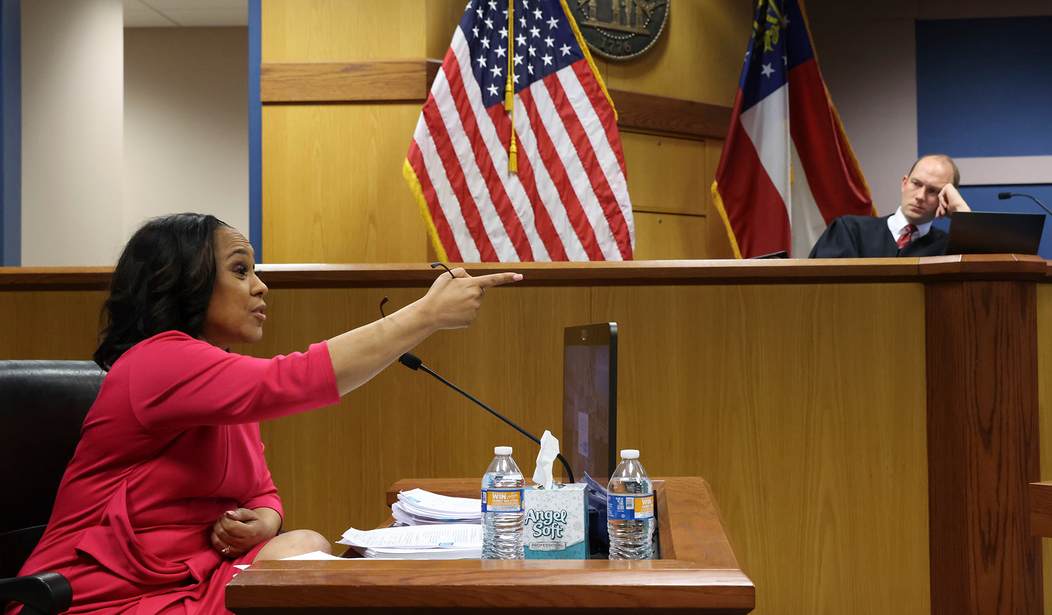Will injustice delayed become injustice denied? Fani Willis and Donald Trump will eventually find out.
This week, the appellate court in Georgia agreed to hear the defense objection to the ruling that denied their disqualification motion against Willis. Notably, the court later also froze all action in the case, where Judge Scott McAfee still had significant pre-trial motions to weigh:
On Tuesday, the Georgia Court of Appeals scheduled its hearing to weigh an effort from Trump and seven other co-defendants' to disqualify Willis from trying her case against the former president over his alleged attempts to overturn the Peach State's 2020 election results. That hearing is set for early October.
One day later, the appeals court said the case will be on hold until a panel of judges rules on whether Willis should be disqualified, and a decision is expected by March 2025, though it could rule sooner.
Has the case been paused entirely, though? The Washington Examiner raises that question in its report because the appeal did not include all of the defendants in Willis' wide-reaching RICO indictment. Technically, McAfee could still work on the issues that relate to the other defendants:
The appeals court technically only stayed the cases of Trump and co-defendants Mike Roman, a Republican operative whose attorneys uncovered the secret relationship between Willis and Wade, along with defendants David Shafer, Robert Cheeley, Mark Meadows, Cathy Latham, Rudy Giuliani, Jeff Clark, and Harrison Floyd.
The remaining defendants who were not part of the disqualification appeal include former Trump campaign attorney John Eastman, Ray Smith, Misty Hampton, Trevian Kutti, Stephen Lee, and Shawn Still.
How exactly would that work in McAfee's court, though? Practically speaking, it would be nearly impossible to proceed on pre-trial work for any of the defendants while half of them have their cases frozen. That's especially true in a RICO case, where the other defendants are held responsible for actions of others.
It really doesn't matter, CNN legal analyst Elie Honig observed yesterday. The appellate court's intervention signals the end of Willis' case, at least in practical terms. There is now zero chance that the Georgia case will happen this year, and almost certainly not next year either.
“It’s over. Let’s be realistic. It’s not happening before the 2024 election. It’s not happening in 2024. It’s maybe not happening at all,” Honig told the network during a segment on Thursday. “Now, look, the appeals court, we can never predict what they’re going to do. But there’s some things we know for sure. Number one, they didn’t have to take this case, the appeal, and they chose to. The other thing is they didn’t have to pause the district court.”
“In fact, the trial court judge, when he issued his ruling, allowing Donald Trump, and the others, to ask the appeals court to take the case, the trial court judge specified, while you all are doing that, I am going to continue holding proceedings in this trial court,” he continued. “And now, today, just a couple hours ago, the appeals court said no, no, no, pause that, too. So, that tells me that they are taking this appeal very seriously. And if Trump and the defendants prevail in this appeal, this case is essentially toast.”
Former federal judge Shira Scheindlin didn't think this would have gone to trial before the election even without the stay. Nonetheless, Scheindlin said she wasn't surprised that the appellate court took up the appeal, nor that they paused the case indefinitely.
Honig flagged another reason that the appellate court may be inclined to boot Willis from the case:
“There is a separate issue that Trump and the other defendants are going to raise that I think is a bigger deal, which is Fani Willis’ inappropriate comments about the case outside of court,” he said. “Judge McAfee found those comments to be, quote, ‘legally improper,’ and then he did nothing about it. And so, the defense is going to argue to the Court of Appeals, if the prosecutor makes, quote, ‘legally improper’ statements that impair the constitutional rights of the defendant, there needs to be a remedy for that.”
In other words, Fani's case is a mess, and her handling of it has been even worse. The court won't have much trouble justifying her disqualification from the case, but that's where it gets complicated. To do that, they will likely have to disqualify her entire office, or else they leave the case in her control. Thanks to the RICO structure, that means everything in it will have to get handled in another jurisdiction.
The state has a process for assigning cases in these situations, but that raises another question: what prosecutor in Georgia will want to pursue Willis' manufactured RICO predicate, which is the only way she connects Trump to crimes committed by others? It's almost as manipulative as Alvin Bragg's indictment in Manhattan, only with the layer of absurdity of a RICO case with no financial motive or misconduct. Indeed, there was more potential financial misconduct between Willis and Nathan Wade than in the indictment.
The chances of another prosecutor attempting to run out Willis' ground ball after this many errors is next to nil. Honig's right; this case is an ex-parrot that died after a prolonged squawk.








Join the conversation as a VIP Member